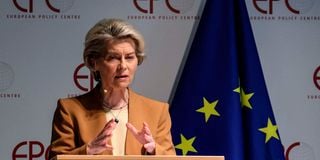Premium
Ukraine is 'determining factor' in China-EU ties: EU chief

President of the European Commission Ursula von der Leyen delivers a keynote address on EU-China relations dubbed "De-risking, not de-coupling Europe and China at this watershed moment" at the European Policy Centre (EPC) in Brussels, Belgium, on March 30, 2023.
EU chief Ursula von der Leyen warned Beijing on Thursday that its stance on Russia's war in Ukraine would determine Chinese-EU ties but said Europe was not looking to "decouple" from China.
The head of the European Commission will accompany French President Emmanuel Macron to Beijing next week as EU leaders reach out to China's Xi Jinping.
The visit -- and another by Spanish Prime Minister Pedro Sanchez starting Thursday -- comes after Xi staged a show of solidarity with Russian President Vladimir Putin in Moscow last week.
"Far from being put off by the atrocious and illegal invasion of Ukraine, President Xi is maintaining his 'no limits friendship' with Putin's Russia," von der Leyen said in a major policy address.
China has tried to position itself as a neutral mediator and pitched what it describes as a plan to help end the fighting.
But it has refused to condemn Moscow's war and there have been warnings from the West against any potential moves to send Russia arms.
Von der Leyen said any "viable" peace plan needed to be on Ukraine's terms and should not consolidate the Kremlin's grip over territories it has seized.
"We have to be frank on this point. How China continues to interact with Putin's war will be a determining factor for EU-China relations going forward," she said.
New world order?
The EU is seeking to define its own approach to Beijing as the United States pushes its European allies to join its tougher stand against China.
Larger economic powers in Europe such as France and Germany are keen not to sever business ties, while more hawkish eastern members are pushing a stronger line.
French Foreign Minister Catherine Colonna urged Beijing on Thursday to avoid "any actions" that would help Russia's offensive in Ukraine.
"We need China to adhere to the principles of international law and the UN Charter," she told reporters while visiting Lithuania, where French troops are finishing a rotation in a NATO air policing mission.
"It is essential that it avoid any actions that could enable Russia to sustain its war effort," Colonna said.
"It is in the interest of all countries... for Russia's aggression to fail," she added.
In Brussels, von der Leyen said it was clear China under Xi was becoming "more repressive at home and more assertive abroad".
Beijing's "clear goal is a systemic change of the international order with China at its centre", she said.
But she insisted that "it is vitally important that we ensure diplomatic stability and open communication lines with China".
'Rebalance' trade
"I believe it is neither viable -- nor in Europe's interest -- to decouple from China," she said. "We do not want to cut economic, societal, political and scientific ties."
The head of the EU's executive arm stressed that "we will never be shy in raising the deeply concerning issues" with Beijing.
"But I believe we must leave space for a discussion on a more ambitious partnership and on how we can make competition fairer and more disciplined," she said.
Von der Leyen said that on trade, the EU was looking to "rebalance" its relationship "on the basis of transparency, predictability and reciprocity".
That included reassessing a landmark investment agreement that has remained stuck due to a stand-off over human rights sanctions.
The EU is already looking to lessen its reliance on China for key minerals such as lithium needed for greener tech.
Von der Leyen said the bloc was mulling the need for "new defensive tools" in sensitive sectors such as artificial intelligence, quantum computing and robotics.
The EU executive will put forward later in the year initial ideas on possible curbs on investments in China that could help bolster Beijing's military might, she said.
"We need to ensure that our companies' capital, expertise, and knowledge are not used to enhance the military and intelligence capabilities of those who are also systemic rivals," she said.




